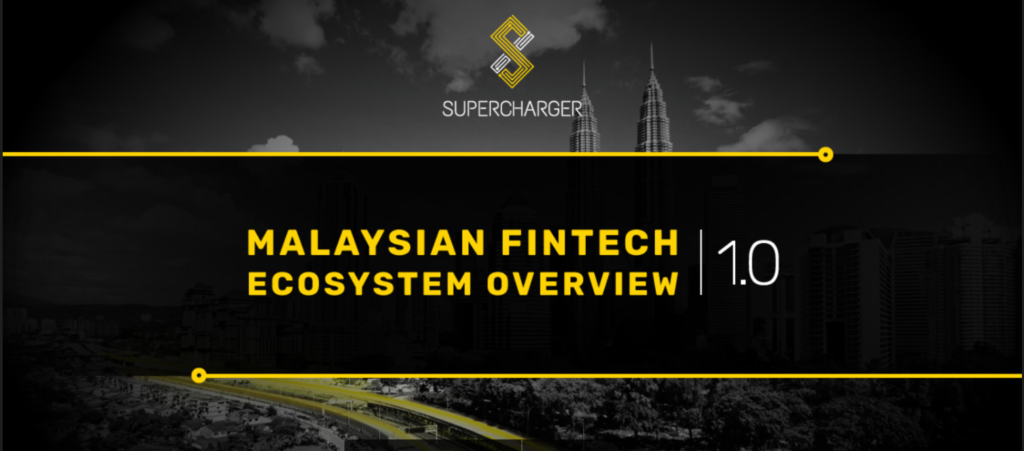
13 Industry Leaders’ Predictions About Where Malaysian Fintech is Headed
by Fintech News Malaysia September 14, 2018SuperCharger, a fintech-focused accelerator operating in KL and Hong Kong have come out with the first of their first Malaysian Fintech Ecosystem report outlining the uniquely Malaysian situations that shape the ecosystem here–particularly regarding trends and potential in the space.
The report contains a breakdown of topics such as the progress of Islamic fintech, our potential as a fintech hub, regulation trends and a few other topics of consideration that could be a useful overview for those interested in the local scene.
Among the report’s contents are also a series of observations by known figures in the startup and fintech industry, ranging from accelerators, observers, regulators, to companies that have built a reputation for themselves, or are in the know about fintech developments and trends.
Here’s What They Have to Say About the Future of Fintech
1. Securities Commission
“While we facilitate the entry of new digital businesses into our ecosystem, the SC is also focused on driving the digitisation of our traditional capital market. This initiative is crucial to unlock greater operational efficiencies within our market, and also enhance the experience for our investors and issuers.
“Moving forward we expect to see more new players emerge, and hope that our incumbents also begin to innovate in their own space. To those seeking to come into the capital market space, we look forward to meeting you, and listen to how you intend to surprise and delight.”
2. Christina Kow, Partner at Shearn Delamore & Co

“[An] area of importance is insurance as evidenced by BNM’s approval of two regulatory sandbox participants involved in insurance. From 1 July 2017, motor insurance ceased to have to be priced based on a fixed motor tariff, and we expect to see developments in the insurtech space on ways to assess risk of drivers for insurance purposes.
On the capital market side, alternative trading systems will be introduced. The Securities Commission Malaysia has invited applicants interested in establishing and operating an alternative trading system in Malaysia to seek participation in its regulatory sandbox. The regulatory support to date augurs well for further developments in fintech innovation to make financial services more efficient and accessible in Malaysia.”
3. Julia Walker, Head of Market Development, Risk and Rectech APAC at Thomson Reuters

“As the world goes through digital transformation it will be critical for Malaysian firms to understand the impacts and opportunities of emerging technologies. Recent regulations around eKYC will force firms to take action this year or be left behind.
The rapid changes and maturation of technologies, from big data management to advanced analytics to machine learning to artificial intelligence and robotic process automation, are fuelling product innovation and providing customers potential opportunities to further “transform operations.”
4. Naysan Munusamy, Co-Founder of MoneyMatch

“I do think a lot of people underestimate or perhaps don’t give enough credit to the progress that has been made in Malaysia in regards to the fintech ecosystem. The fintech industry, unlike other forms of technology business models, comes under heavy regulation due to the sensitive nature of handling monies and transactions of the public. More often than not, these regulations are meant to protect the general public and not so much to put off innovation in the sector.
So whilst the current state of the fintech ecosystem remains young and new without much strong impact to the general public just yet unlike in the UK or US, nonetheless, the foundations have been clearly put into place to enable market maturity hopefully in the near future.”
5. Vincent Fong, Chief Editor of Fintech News Malaysia

“Malaysia’s breed of fintech entrepreneurs are fascinating in that many of them though ambitious, are very practical and pragmatic in the type of innovations they introduce to the market in lieu of moonshot ideas.
In 2018 the battleground for fintech seems to be leaning towards payments, with 2 major Chinese giants like Alipay and WeChat both trying to solidify their base here along with local players each trying to shore up their own value proposition. Certainly, Bank Negara Malaysia’s new payment reform, ICTF would have a significant positive impact in the payments space.”
6. Winnie Chua, Co-Founder of Policystreet

“Heading into 2018, we anticipate more convergence between Malaysia’s old and new economy, relevance of traditional insurance business models being tested and adoption of new transformative business models by insurers as a major indication for growing momentum.
The challenge still remains for both insurers and InsurTechs in educating consumers on the importance and inherent uniqueness of insurance itself. True transformation of the industry will happen as Malaysian insurers, takaful operators and InsurTechs look to reimagine risk altogether, exploring creative synergies between evolving Malaysian society and technology.”
7. Paul Endacott, Regional Managing Director of Ambition & HaTCH

“Compared to other parts of the world, it is early days for fintech in Malaysia. Having said that, investors are fully aware that Malaysia has all the right conditions to compete within the Fintech space.
However, it’s worth noting that fintech isn’t just about startups disrupting existing financial institutions, but the rise in fintech is about the evolution of the industry where often startups, financial institutions, government and education work hand in hand to support this. Malaysia recognises the importance of this and it is encouraging to see the efforts that are being made to bring this ecosystem together to solve these problems now and also, sustainably, over the long term.”
8. Robin Lee, CEO of HelloGold

“HelloGold chose Malaysia as our proof-of-concept market because it is, in many ways, an economic goldilocks. It has a sizeable (yet manageable) domestic market of some 30 million made up of three distinct cultures – Muslims, Chinese and Indians – with a significant population that remains underserved by the formal financial system and, more importantly, a high smartphone penetration.
Looking forward to the next 12 months, it would be great to see the emergence of a truly collaborative ecosystem – between government and its various agencies, incumbents and start-ups – one that will provide a conducive environment for fintechs to mount a challenge on the global stage.”
9. Mark Smalley, CEO and Co-Founder of Neuroware

“Tokenization beyond the ICO hype will also start to see fruition – especially with both the Equity Crowdfunding and P2P lending markets finally reaching the necessary maturity to justify the issuance of new upcoming licenses from SCM.
There’s now a flurry of stakeholders working on various Secondary Market opportunities. These new platforms and services will essentially provide interoperability between the different market operators and the countless investors and issuers that will be trading on those platforms. Can our current traditional financial infrastructure support these new innovations in FinTech that are starting to gain traction? Without the banks and (or) trustee providers having even the most basic of APIs; it’s no surprise that many are starting to turn their attention to blockchains and other distributed ledger technologies.”
10. Bikesh Lakhmichand, CEO and Co-Founder of 1337 Accelerator

“Malaysia’s Fintech scene is like a spike, rather than being well-rounded; only a small amount of verticals are being
explored, and currently are very competitive.Many startups are exploring “gold mines” and blue oceans [within the other verticals]. In fact, out of the 200 startups that applied to our recent accelerator programme, Alpha Startups: Fintech Edition, only 5.3% of applications were e-wallets. This could probably be due to the space maturing, and also thanks to the giants that scare these startups off. We’re excited to see what could possibly transpire in the future, and hope that the next big fintech would come from Malaysia.”
11. Sue Wan Wong & Ying Yong Choo at Wong & Partners

“In the past year, Malaysian regulators are taking an open but cautious approach in embracing the digital revolution and emergence of Fintech firms by balancing technological innovation with investor protection.
The Securities Commission has played an active role in creating a conducive environment for the development of fintech businesses. the SC has signed a series of innovation co-operation agreements, or more commonly referred to as “fintech bridges” with regulators in major financial centers such as Hong Kong, Dubai and Singapore. Bank Negara Malaysia has also increased their efforts in engaging the relevant stakeholders since the commission of the Financial Regulatory Sandbox Framework.
As a whole, the regulatory framework in Malaysia will ensure that the financial services sector keeps up with the paradigm shift in the use of technology in providing financial services, and therefore continues to remain relevant regionally and globally.”
12. Joanne Tan, Digital Innovation Lead at Allianz Bank

“In the last three years, we see increasing collaborations between financial institutions and fintech startups. With open minds, financial institutions are now harnessing new solutions and technologies that startups are bringing to the table, and learning along the way, the speed and agility of the startup culture as well. While on the outlook incumbent financial institutions seem to be benefitting the most from these partnerships, startups are also benefitting significantly from the incumbents’ wealth of industry knowledge and experience, stable branding, existing customer base, and guide on industry regulations.
Moving forward, the fintech scene in Malaysia will only get more exciting as financial institutions engage and dabble more actively in fintech. Some of the financial institutions have already begun redefining business strategies in order to flourish in the digital revolution. Financial institutions are developing a keen affinity to acquiring and adopting new technologies and capabilities to deliver products and services that meet customers’ ever-changing needs. In the next few years or so, it will be an interesting battlefield to watch where competition will intensify, not only among the industry incumbents but also between the two groups – the financial institutions and the startups.”
13. Dato’ Lee Kok Kwan, Chairman of BIX

“Bond & Sukuk Information Exchange (BIX) is a non-profit information platform established to provide free access to information on bonds and sukuk issued in Malaysia where the current outstanding is in excess of RM1.3 trillion.
It is important to further democratise the RM1.3 trillion Malaysian bond sukuk markets to all as Malaysia is a high savings rate nation where there is a need to expand the investable asset class beyond equities, bank deposits and property to also encompass fixed income with its much higher certainty of total returns over a longer investment horizon. The success of the domestic currency Ringgit bond sukuk markets has also been a strong factor contributing to the resiliency of the nation as there is minimal reliance and exposure to foreign currency funding.”

The quotes listed above are excerpts taken from SuperCharger fintech accelerator’s Malaysian Fintech Ecosystem Overview. The full report, which includes the full transcript of the above opinions can downloaded here.






